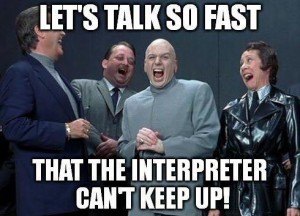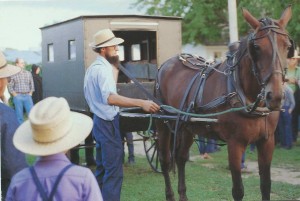 Your question is hanging in midair and the witness, in the sworn proceeding is looking at you, gape mouthed. Was the question clear? Or maybe the witness is deciding what part of it to answer. You could be facing a cycle of delays and frustration. This occurs whether the proceeding is interpreted or not. But it does seem that as the interpreter, I can see the disconnect happen before the questioning attorney catches on.
Your question is hanging in midair and the witness, in the sworn proceeding is looking at you, gape mouthed. Was the question clear? Or maybe the witness is deciding what part of it to answer. You could be facing a cycle of delays and frustration. This occurs whether the proceeding is interpreted or not. But it does seem that as the interpreter, I can see the disconnect happen before the questioning attorney catches on.
The fault lies in the broad wording of the question that allows for a flexibility in responsiveness. Add a nervous, reluctant, or even impatient witness and you have Q&A chaos. I’ve even got a name for it: the “Who’s On First” scenario after the famous Abbott and Costello comedy sketch.
It’s no fun for any of us to go down that bumpy road. Sometimes the lawyers get irritated at each other as the objection, “Non Responsive” triggers the objection: “Asked and Answered” over and over. Other times I’ve seen the questioning attorney instruct that the question be certified because the opposing counsel will refuse to allow the question to be repeated after several attempts. Fact witnesses and Pro Se witnesses, who are unfamiliar with the questioning process, can quickly stymie whatever progress has been made when the “Who’s On First” routine starts up.
In such cases that there is an interpreter, professional interpreters know to simply be patient, show no reaction and continue interpreting accurately and completely. These situations are not a challenge to an interpreter.
In 1999, Claims Magazine, the national publication of the Insurance industry, published my article titled, What do You Mean by That? Specific Terms in a Q&A Produce Direct Responses. You can find the article on my website here http://www.linguisticworld.com/books_and_articles.html. At the date of this blog post it is a full 17 years later and I still see many of these examples of questions that sink.
The most common culprit is the compound question. This is a question that contains two or more questions being asked. Often it offers alternative responses much like a multiple choice question. This kind of question is standard for casual conversation but in a Q&A setting, where the person is under oath, a single yes or no to such a question encompasses more factors. Another form is when the subject action is maintained but extra dates, times and persons are added to the single event.
Unfortunately, even a seemingly simple question can be compound. The Yes or No to “Do you know if the light was red for the other driver?” could be responsive to the light being red or not, or it could be responsive to the witness knowing or not. Several clients of mine offer a follow up question to that one with a “No, you don’t know or no, the light wasn’t red?” And surprisingly, the response is the complete answer that contains the question.
The solution is to break down the question as soon as you see the witness is not able to transition to compound questions smoothly. Limit high register legalese terminology that will trigger confusion. The result will be more concise responses and a well-connected communication.




 “Commerce comes second to craft” and it struck a chord with me. I can hear a chorus of agreement with those words when applied to almost any business. If you have a faulty product (your craft) then your commerce (profit) is not guaranteed. I bet it is a very popular quote to use at annual meetings and the like. Advertising agencies would really put a nice spotlight on their corporate clients with those words.
“Commerce comes second to craft” and it struck a chord with me. I can hear a chorus of agreement with those words when applied to almost any business. If you have a faulty product (your craft) then your commerce (profit) is not guaranteed. I bet it is a very popular quote to use at annual meetings and the like. Advertising agencies would really put a nice spotlight on their corporate clients with those words.